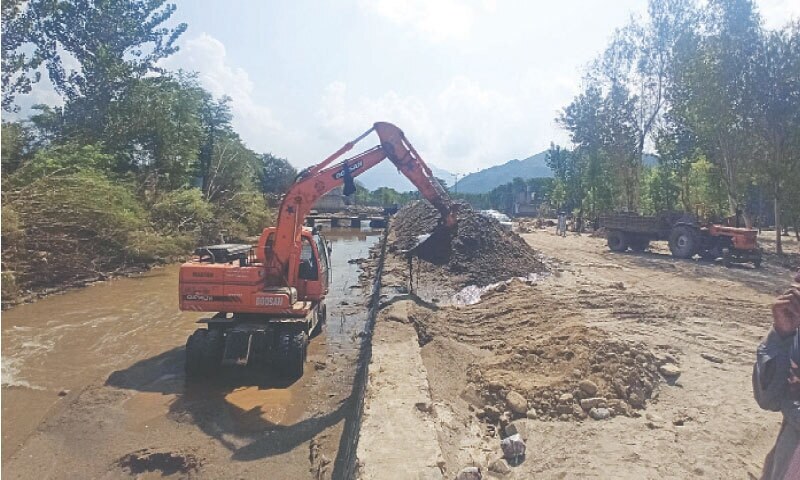By Manzoor Ali
Copyright dawn

THE narrow road to Beshonai is crowded with NGO workers, distributing aid among the survivors of the Aug 15 deluge that killed over 200 people and swept away livelihoods in this district.
The air hangs heavy and a hot afternoon sun beats down on the flood-ravaged neighbourhood littered with heavy boulders left by torrents.
Most of the village is in ruins, and mangled steel bars, broken roofs, and columns are peering out from under the rubble.
On Aug 15, flash floods tore through this hamlet, leaving a trail of destruction and trauma in their aftermath.
Still reeling from trauma of calamitous flooding, meagre compensation hampers Beshonai residents’ recovery
Still reeling from the shock, the villagers are even unsure about the number of their dead: everyone gives a figure. Some say it’s 84, while others believe 74 people died. However, many claim that several of their community members remain missing.
Besides physical destruction, the villagers also speak of mental scars inflicted by the deluge.
Jalal Ahmed, a student at the University of Buner, said they are paralysed by fear. “A large number of women from the area are still living with their relatives and refusing to come back, fearing more floods,” he added.
Hussain Shah, who lost his brother in the flood, told Dawn that when their local stream flooded on Aug 31, everyone in the village rushed to the nearby mountain in panic. “Women clutching their babies ran crying hysterically,” he says.
According to Dr Afsar Ali, a medical officer with the NGO Muslim Hands, at least 10pc of 200 patients examined by them suffer from anxiety and post-traumatic stress disorder (PTSD). “After counseling, we refer them to the district headquarters hospital for psychological rehabilitation,” Dr Ali told Dawn.
Dr Siraj Kamal agrees with his colleague, saying the situation will get worse once the shock wears off. “Now people are too busy with reconstruction, taking care of the injured and running after aid, and when all this is over, they will be hit harder by the depression and trauma,” Dr Kamal added.
But reconstruction also has its challenges. The villagers are particularly concerned about the compensation package offered by the government. Sahibullah, a resident, calls for their relocation to some other location, fearing the villager “could never rise from its ashes”.
Traders and shopkeepers aren’t happy as well, as they try to make repairs in the Pir Baba Bazaar, one of the busiest commercial centres in the district. A thick pall of dust follows every passing car, as traders install new shutters and shelves in their shops. Al Khidmat Foundation, the welfare arm of the Jamaat Islami, has painted the exterior of the damaged shop in its own blue colour.
Syed Wahid, president of Pir Baba Bazaar traders, estimates damages to the tune of Rs30 million, which the government’s aid package hardly addressed.
“Government is treating those who lost million and those who loses are in thousands with the same yardstick,” he complained. “How, those who have lost millions, are going to get their life on track with merely Rs500,000,” he questioned, while criticising the government for its unilateral approach.
“I am president of this bazaar where over 800 shops have been affected due to the floods and the authorities did not even bother to ask me for a meeting,” he rues. For Mr Wahid, interest-free loans by the government could help restart their businesses.
Khairullah Khan, a pharmacy shop owner, lost medicines worth Rs1.3 million besides damages to his shop. “Four shutters alone cost me Rs50,000 and I have to install shelves and do other repairs,” he told Dawn.
As the government response remains sluggish, Mufti Fazal Ghafoor the Jamiat Ulema-i-Islam Fazl has made efforts to fill the vacuum.
A large number of locals were seen heading to a hujra at some distance from the Pir Baba Bazaar, where Mufti Ghafoor distributed sewing machines, photocopiers, and equipment for welders, electricians and carpenters besides other material.
The project, being executed through donations, also includes the construction of several two-room houses for orphans and widows as well as distribution of vans and rickshaws for those who have lost their means of livelihoods.
“We are working on construction of 40 houses and have laid foundation of 12 so far in various parts of the district,” Mufti Ghafoor told Dawn. He said that in some instances, they have also arranged land for construction of these houses. He said that they have also distributed walkie-talkies among locals of Beshonai for easy communication, as cellphone coverage was still patchy in the area.
Following the evening prayers, a large number of party’s activists gathered at a service station in the bazaar, which they had repurposed as a relief coordination centre, reporting about their activities.Mufti Ghafoor said that with the help of 5000 seminary students, they cleaned the Pir Baba Bazaar and residential areas in the surrounding neighbourhoods.
“There are many roads still not fully restored… I would have cleared them by now if I had the machinery,” Mufti Ghafoor added.
Published in Dawn, September 15th, 2025



